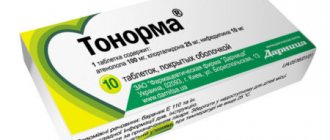Pharmacological properties of the drug Fozinopril
ACE inhibitor. Reduces the formation of angiotensin II from angiotensin I, which leads to a decrease in peripheral vascular resistance and systemic blood pressure. Suppresses the synthesis of aldosterone in the adrenal glands. The onset of therapeutic action is observed 1 hour after oral administration, the maximum reduction in blood pressure is achieved within 3–6 hours. The hypotensive effect persists for 24 hours, however, it may take 2–3 weeks to achieve a stable hypotensive effect in some patients. During long-term treatment, the effect persists. After oral administration, about 36% of fosinopril is absorbed in the digestive tract; the degree of absorption does not depend on food intake. Hydrolysis of fosinopril with the formation of pharmacologically active fosinoprilat occurs in the mucous membrane of the digestive tract and partially in the liver. The maximum concentration of fosinoprilat in blood plasma is achieved after 3 hours. Plasma protein binding is 95%. Does not penetrate the BBB. Fosinoprilat is excreted unchanged in urine and bile. The half-life is 11.5 hours. In patients with renal failure, there is no noticeable change in the pharmacokinetics of fosinopril due to a compensatory increase in its excretion by the liver. In patients with impaired liver function, a slight decrease in the hydrolysis of fosinopril is possible. There is evidence of a compensatory increase in the excretion of fosinopril by the kidneys with a simultaneous decrease in the hepatic clearance of fosinopril in this category of patients.
Fosinopril
Before starting treatment, it is necessary to analyze previous antihypertensive therapy, the degree of increase in blood pressure, dietary restrictions on salt and/or liquid, and other clinical situations.
If possible, previous antihypertensive treatment should be discontinued several days before starting treatment with Fosinopril.
Patients with malignant arterial hypertension or concomitant decompensated chronic heart failure should begin treatment in a hospital setting.
To reduce the likelihood of arterial hypotension, diuretics should be discontinued 2-3 days before starting treatment with Fosinopril.
Before and during treatment with Fozinopril, it is necessary to monitor blood pressure, kidney function, the content of potassium ions, creatinine, urea, electrolyte concentrations and the activity of “liver” transaminases in the blood.
Angioedema
Various effectiveness of ACE inhibitors has been reported in patients of different races and a higher risk of developing angioedema in black patients while taking fosinopril. If swelling of the tongue, pharynx, or larynx spreads, airway obstruction may develop, which can be fatal. If such reactions develop, it is necessary to stop taking the drug and take emergency treatment measures, incl. inject a solution of epinephrine (adrenaline) subcutaneously (1:1000). In most cases of swelling of the face, oral mucosa, lips and extremities, stopping the drug led to normalization of the condition; however, appropriate therapy was sometimes required.
Swelling of the intestinal mucosa
While taking ACE inhibitors, swelling of the intestinal mucosa has been observed in rare cases. Patients complained of abdominal pain (there may have been no nausea and vomiting); in some cases, swelling of the intestinal mucosa occurred without swelling of the face; C1-esterase activity was normal. Swelling of the intestinal mucosa should be taken into account in the differential diagnosis of patients with complaints of abdominal pain during treatment with ACE inhibitors. Symptoms disappeared after stopping the use of ACE inhibitors.
Anaphylactic reactions during dialysis using high-permeability membranes
During therapy with ACE inhibitors, anaphylactic reactions may develop during hemodialysis using highly permeable membranes (for example, AN®69), as well as during plasmapheresis of low-density lipoproteins with adsorption on dextran sulfate. In such cases, the use of a different type of dialysis membrane or other drug treatment should be considered.
Anaphylactic reactions during desensitization
In two patients, during desensitization with hymenoptera venom while taking the ACE inhibitor enalapril, life-threatening anaphylactoid reactions were noted. In the same patients, these reactions were avoided by timely interruption of the ACE inhibitor; however, they reappeared after inadvertent resumption of an ACE inhibitor. Particular caution should be exercised when performing desensitization in patients taking ACE inhibitors.
Neutropenia/agranulocytosis
It is possible to develop agranulocytosis and suppression of bone marrow function during treatment with ACE inhibitors. These cases are more common in patients with impaired renal function, especially in the presence of systemic connective tissue diseases (including systemic lupus erythematosus or scleroderma). Before starting therapy with ACE inhibitors and during treatment, the total number of leukocytes and leukocyte formula are monitored (once a month in the first 3-6 months of treatment and in the first year of using the drug in patients with an increased risk of neutropenia).
Arterial hypotension
In patients with uncomplicated arterial hypertension, arterial hypotension may develop due to the use of the drug Fozinopril. Symptomatic hypotension with the use of ACE inhibitors most often develops in patients after intensive treatment with diuretics, a salt-restricted diet, or during renal dialysis. Transient arterial hypotension is not a contraindication for the use of the drug after measures have been taken to restore circulating blood volume.
In patients with arterial hypertension and bilateral renal artery stenosis or stenosis of the artery of a single kidney, as well as with simultaneous use of diuretics in patients with unchanged renal function, the concentration of urea nitrogen and serum creatinine may increase during treatment with ACE inhibitors. If these effects do not go away after stopping treatment, then it is necessary to reduce the dose of Fosinopril and/or diuretic.
In some cases, in patients with severe chronic heart failure, treatment with ACE inhibitors may cause a more pronounced antihypertensive effect, which can lead to oliguria or azotemia, which can be fatal. Therefore, when treating chronic heart failure with Fosinopril, patient monitoring is necessary, especially during the first 2 weeks of treatment, as well as with any increase in the dose of Fosinopril or a diuretic. It may be necessary to reduce the diuretic dose in patients with normal or low blood pressure, who have previously received diuretic therapy, or who have hyponatremia. Arterial hypotension as such is not a contraindication for further use of the drug in chronic heart failure.
Some reduction in systemic blood pressure is a common and desirable effect when starting the drug in chronic heart failure. The extent of this reduction is greatest early in treatment and stabilizes within one or two weeks of starting treatment. Blood pressure usually returns to baseline levels without a decrease in therapeutic efficacy.
Liver dysfunction
In rare cases, when using ACE inhibitors, a syndrome is observed, the first manifestation of which is cholestatic jaundice. This is followed by fulminant liver necrosis, sometimes fatal.
The mechanism of development of this syndrome has not been studied.
If noticeable jaundice appears and a marked increase in the activity of “liver” transaminases, therapy with Fozinopril should be discontinued and appropriate treatment should be prescribed.
In patients with impaired liver function, increased plasma concentrations of fosinopril may be observed. In liver cirrhosis (including alcoholic cirrhosis), the apparent total clearance of fosinoprilat is reduced, and the area under the AUC curve is approximately 2 times higher than in patients without liver dysfunction.
Renal dysfunction
In patients with arterial hypertension with unilateral or bilateral renal artery stenosis or stenosis of the artery of a solitary kidney, the concentration of blood urea nitrogen and serum creatinine may increase during treatment with ACE inhibitors. These effects are usually reversible and disappear after treatment is stopped. It is necessary to monitor renal function in such patients in the first weeks of treatment. In some patients, increases in blood urea nitrogen and serum creatinine concentrations (usually small and transient) may be observed even without obvious renal impairment when the drug is used concomitantly with diuretics. A dose reduction of Fosinopril may be required.
In patients with severe chronic heart failure, renal function may be dependent on the activity of the RAAS, so treatment with ACE inhibitors may be accompanied by oliguria and/or progressive azotemia, and in rare cases lead to acute renal failure and death.
Hyperkalemia
There have been cases of increased serum potassium levels in patients taking ACE inhibitors, including fosinopril. The risk group in this regard includes patients with renal failure, type I diabetes mellitus, as well as those taking potassium-sparing diuretics, potassium-containing nutritional supplements or other drugs that increase the level of potassium in the blood serum (for example, heparin).
Cough
When using ACE inhibitors, including fosinopril, a dry cough was observed, which disappeared after discontinuation of therapy. When cough occurs in patients taking ACE inhibitors, this therapy should be considered as a possible cause in the differential diagnosis.
Surgery/general anesthesia
ACE inhibitors may enhance the antihypertensive effect of drugs used for general anesthesia. Before surgery (including dentistry), it is necessary to warn the anesthesiologist about the use of ACE inhibitors.
Caution should be exercised when exercising or in hot weather due to the risk of dehydration and hypotension due to decreased circulating blood volume.
Based on the results of epidemiological studies, it is assumed that the simultaneous use of ACE inhibitors and insulin, as well as oral hypoglycemic agents, can lead to the development of hypoglycemia. The greatest risk of development is observed during the first weeks of combination therapy, as well as in patients with impaired renal function. In patients with diabetes mellitus, careful glycemic control is required, especially during the first month of ACE inhibitor therapy.
Side effects of the drug Fozinopril
from the digestive system: rarely - nausea, vomiting, dyspepsia, increased activity of liver transaminases; cases of pancreatitis and hepatitis have been described; from the respiratory system: cough, rarely - pharyngitis, laryngitis, sinusitis, bronchospasm; from the cardiovascular system: palpitations, chest pain, rarely - orthostatic hypotension, collapse, hot flashes, arrhythmia; allergic and immunological reactions - skin rash, itching, photosensitivity, angioedema, myalgia, arthralgia; from the urinary system - proteinuria, oliguria, disorders of excretory function, accompanied by an increase in the concentration of creatinine and urea in the blood plasma; other reactions - dizziness, fatigue, impaired taste and other types of sensitivity.
Special instructions for the use of the drug Fozinopril
Prescribe with caution to patients with renovascular hypertension, heart failure, patients on hemodialysis, as well as patients with hypovolemia and/or reduced plasma osmolarity of any etiology due to the increased risk of developing side effects from the kidneys. In order to reduce the risk of arterial hypotension, diuretics should be discontinued 2-3 days before fosinopril is prescribed and the water and electrolyte balance should be corrected. In patients with left ventricular hypertrophy, long-term use of fosinopril leads to a decrease in left ventricular mass and a decrease in the thickness of the interventricular septum. After discontinuation of fosinopril, no withdrawal syndrome (sharp increase in blood pressure) is observed. The safety and effectiveness of fosinopril in pediatric practice has not been established. No special adjustment of the fosinopril dosage regimen is required in elderly patients. Women of reproductive age receiving fosinopril should use reliable contraception.
Fosinopril, 20 mg, tablets, 30 pcs.
Patients with malignant arterial hypertension or concomitant decompensated chronic heart failure should begin treatment in a hospital setting.
Before starting therapy with ACE inhibitors and during treatment, count the total number of leukocytes and determine the leukocyte formula (once a month in the first 3-6 months of treatment and at periodic intervals up to 1 year in patients with an increased risk of neutropenia: with impaired renal function, systemic connective tissue diseases in those receiving high doses), as well as at the first signs of infection. Before and during treatment, it is necessary to monitor blood pressure, kidney function, potassium (K+) content in the blood plasma, hemoglobin and creatinine, urea, electrolyte levels and the activity of “liver” enzymes in the blood.
Based on the results of epidemiological studies, it is assumed that the simultaneous use of ACE inhibitors and insulin, as well as hypoglycemic drugs for oral administration, can lead to the development of hypoglycemia. The greatest risk of development is observed during the first weeks of combination therapy, as well as in patients with impaired renal function. In patients with diabetes mellitus, careful glycemic control is required, especially during the first month of ACE inhibitor therapy.
Caution must be exercised when prescribing to patients on a low-salt or salt-free diet (increased risk of hypotension).
Safety and efficacy in pediatric practice: Close monitoring for hypotension, oliguria and hyperkalemia is recommended for neonates exposed in utero to ACE inhibitors.
Caution should be exercised when exercising or in hot weather due to the risk of dehydration and decreased blood pressure due to decreased fluid volume.
Before surgery (including dentistry), the surgeon/anesthesiologist must be warned about the use of ACE inhibitors.
When using ACE inhibitors in the II-III trimesters of pregnancy, oligohydramnios, arterial hypotension of the fetus and newborn, oliguria and deaths are possible.
Angioedema has been reported in patients using fosinopril. Swelling of the tongue, pharynx, or larynx can cause airway obstruction, which can be fatal. If such reactions develop, patients should stop taking the drug and receive subcutaneous administration of epinephrine (adrenaline) (1:1000), as well as other emergency treatment measures.
Swelling of the intestinal mucosa has rarely been observed while taking ACE inhibitors. In such cases, patients complained of abdominal pain (there may have been no nausea and vomiting); in some cases, swelling of the intestinal mucosa occurred without swelling of the face; the level of C1-esterases was normal. Symptoms disappeared after stopping the use of ACE inhibitors. Swelling of the intestinal mucosa should be taken into account in the differential diagnosis of patients with complaints of abdominal pain during treatment with ACE inhibitors.
During therapy with ACE inhibitors, anaphylactic reactions may develop during hemodialysis through highly permeable membranes, as well as during LDL apheresis with adsorption on dextran sulfate. In such cases, the use of a different type of dialysis membrane or other drug treatment should be considered.
It is possible to develop agranulocytosis and suppression of bone marrow function during treatment with ACE inhibitors. These cases occur more often in patients with impaired renal function, especially in the presence of systemic connective tissue diseases (systemic lupus erythematosus or scleroderma). Before starting therapy with ACE inhibitors and during treatment, the total number of leukocytes and the leukocyte formula are determined (once a month in the first 3-6 months of treatment and in the first year of using the drug in patients with an increased risk of neutropenia).
If noticeable icterus and a marked increase in liver enzyme activity occur, fosinopril treatment should be discontinued and appropriate treatment should be prescribed.
In patients with arterial hypertension with bilateral renal artery stenosis or stenosis of the artery of a solitary kidney, as well as with simultaneous use of diuretics without signs of renal vascular disease, the concentration of blood urea nitrogen and serum creatinine may increase during treatment with ACE inhibitors. These effects are usually reversible and disappear after treatment is stopped. A dose reduction of diuretic and/or fosinopril may be required.
In patients with uncomplicated arterial hypertension, arterial hypotension may develop due to the use of the drug fosinopril.
Symptomatic hypotension with the use of ACE inhibitors most often develops in patients after intensive treatment with diuretics, a salt-restricted diet, or during renal dialysis. Temporary arterial hypotension is not a contraindication for the use of the drug after taking measures to hydrate the body.
In patients with severe chronic heart failure with altered RAAS activity, treatment with ACE inhibitors may cause excessive antihypertensive effects, which can lead to oliguria, progressive azotemia and, in rare cases, acute renal failure with possible death. Therefore, when treating chronic heart failure with fosinopril, patients should be closely monitored, especially during the first 2 weeks of treatment, as well as with any increase in the dose of fosinopril or diuretic.
Some reduction in systemic blood pressure is a common and desirable effect when starting the drug for heart failure. The degree of this reduction is maximum in the early stages of treatment and stabilizes within 1-2 weeks from the start of treatment. Blood pressure usually returns to pre-treatment values without a decrease in therapeutic efficacy.
ACE inhibitors may enhance the antihypertensive effect of drugs used for general anesthesia: Before surgery (including dentistry), you must warn your doctor about the use of ACE inhibitors.
Impact on the ability to drive vehicles and operating machinery
Caution should be exercised when driving or performing any work that requires increased alertness due to the possible occurrence of dizziness, especially after the initial dose of the drug in patients taking diuretic drugs.



